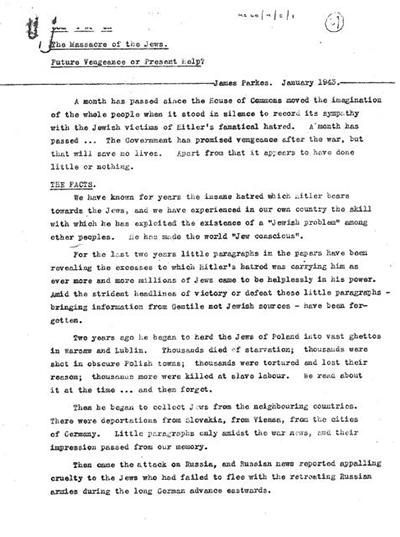
This is a remarkable document both in content and tone (the capitalisation and underlining reflect the moral energy and anger with which Parkes typed it out). The article was never published for reasons that can only be speculated about. It is not clear which journal or newspaper James Parkes had in mind. Perhaps it was regarded as too hard hitting and critical of the British government? Carolyn Sanzenbacher suggests that because of an ongoing dispute with his own Church of England and its refusal to abandon conversionism at the same time that Parkes was less in favour, including with his mentor, William Temple, the archbishop of Canterbury. Frustratingly, we will never know the exact reason it failed to appear in the public domain.
But it is a document that deserves to be well-known. In late 1942 more and more information was coming to Britain from a variety of sources – Jewish and Polish – about the fate of the Jews and what was becoming clearer to those concerned was an actual Nazi plan of total extermination of the Jews. On 17 December 1942 the House of Commons stood in a minute’s silence as the Allied Declaration on the Jews was read out. Debate, however, was curtailed and only post-war retribution rather than action to save the Jews now was promised by the British government.
Activists such as the MP Eleanor Rathbone, the publisher Victor Gollancz and James Parkes (1896-1981) himself, a campaigner against antisemitism since the 1920s and the person who did more than any of his contemporaries to improve Jewish/non-Jewish relations, were appalled at the British government’s response, or lack of response to the crisis of European Jewry. On Christmas Day 1942 Gollancz wrote an impassioned pamphlet, Let My People Go, to urge the British people to demand action from its government. Later in 1943 Rathbone, and the body she had created and in which Gollancz, Parkes and others were activists – the National Committee for Rescue from Nazi Terror – published another: Rescue the Perishing.
If Parkes’s unpublished article is added to those of Gollancz and Rathbone, they reflect a profound understanding of the scale of the Nazi crime and the destruction of European Jewry – they assimilated the news as it was happening from often obscure sources and responded immediately and passionately to this humanitarian crisis. There are small elements of detail that reveal some minor misunderstandings – including electrocution as a means of mass murder – but what is more surprising is how detailed and accurate these accounts are.
Equally, they attempt in their different ways to make ordinary people in Britain understand what was happening and feel a responsibility to save as many of them as was possible. To Parkes, there was no ethical excuse to do otherwise.
Source commentary provided by:
Professor Tony Kushner
James Parkes Professor of Jewish/non-Jewish Relations
A.R.Kushner@soton.ac.uk